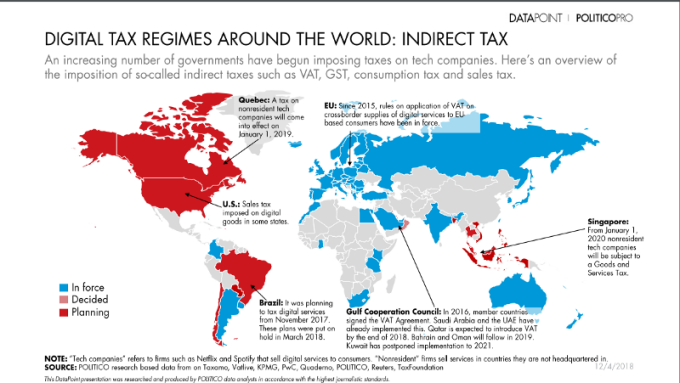With effect from January 1, 2021, all digital marketplaces operating in Kenya will now be required to pay a 1.5% digital service tax after the Finance Act 2020 amendment of the Income Tax Act of Kenya was passed into law.
The new 1.5% ‘Digital Service Tax’ imposed on the gross transaction value of services is due at the time of payment.
Here Is What You Need To Know
- Additionally, under Kenya ’s new 2020 Value Added Tax (Digital Market Supply) Regulations, digital marketplaces (ecommerce websites) that fail to pay Value Added Tax (at 14%) pursuant Section 5(8) of the country’s Value Added Tax Act, 2013 shall, in addition to the penalties prescribed under the law, be liable to restriction of access to their websites in Kenya until such tax is paid.
- With these regulations, Kenyan Revenue Authority (KRA) is targeting ecommerce platforms with taxes to fund the Sh3 trillion ($28 billion) 2020/2021 budget.
“A digital marketplace supplier from an export country who is required to register under the simplified VAT registration framework shall apply to the Commissioner for registration within thirty days from the publication of these regulations,” the regulation reads in part.
- Under the regulation, any person offering taxable services through a digital marketplace (ecommerce) shall be required to register for tax in Kenya.
- The new tax now means that if, for instance, you are are taking an Uber and the cost of the trip is KES 100, the digital service tax is KES 1.5. If the fee is KES 200, the tax is KES 3.
- The Kenya Revenue Authority (KRA), in charge of implementing and enforcing taxes in Kenya, has said it has created a special unit to track transactions and tax multi-nationsl using data-driven detection.
Which Digital Marketplaces (Ecommerce) Are To Pay Tax?
The taxable services made through a digital marketplace shall include electronic services under Section 8(3) of the Value Added Act and: –
- Downloadable digital content including downloading of mobile applications, e-books and movies;
- Subscription-based media including news, magazines, journals, streaming of TV shows and music, podcasts and online gaming;
- Software programs including downloading of software, drivers, website filters and firewalls;
- Electronic data management including website hosting, online data warehousing, file-sharing and cloud storage services;
- Supply of music, films and games;
- Supply of search-engine and automated helpdesk services including supply of customized search-engine services;
- Tickets bought for live events, theaters, restaurants etc. purchased through the internet;
- Supply of distance teaching via pre-recorded medium or e-learning including supply of online courses and training;
- Supply of digital content for listening, viewing or playing on any audio, visual or digital media;
- Supply of services on online marketplaces that links the supplier to the recipient, including transport hailing platforms;
- Any other digital marketplace supply as may be determined by the Commissioner.

Read also: 75% Of Kenya’s Small, Medium Businesses May Collapse Before By June — Central Bank Of Kenya
What Criteria Are To Be Used In Determining Whether The Digital MarketPlace Is Required To Pay VAT?
Under the new regulations, a digital services company (Ecommerce) rendering taxable services through a digital marketplace shall be required to register for VAT in Kenya if:
(a) the online services are offered by a business located outside Kenya to an end user in Kenya in business-to-consumer transactions.
(b) the business entity is doing business in Kenya and any of the following situations occur:
(i) the user of the services is in Kenya; or
(ii) the payment made to the business entity staying outside Kenya by the user, for the rendering of the internet-based services, starts from a Kenyan bank registered or authorized in the country; or
(iii) the user of the internet-based services, even though he/she resides outside Kenya, has business, residential or postal address in Kenya.
In any case, where the business entity staying outside Kenya to offer the business-to-customer services is not able to register for tax under the simplified Kenyan VAT registration framework, it shall appoint a tax representative to account for the VAT on their digital services.
Charles Rapulu Udoh

Charles Rapulu Udoh is a Lagos-based lawyer who has advised startups across Africa on issues such as startup funding (Venture Capital, Debt financing, private equity, angel investing etc), taxation, strategies, etc. He also has special focus on the protection of business or brands’ intellectual property rights ( such as trademark, patent or design) across Africa and other foreign jurisdictions.
He is well versed on issues of ESG (sustainability), media and entertainment law, corporate finance and governance.
He is also an award-winning writer
